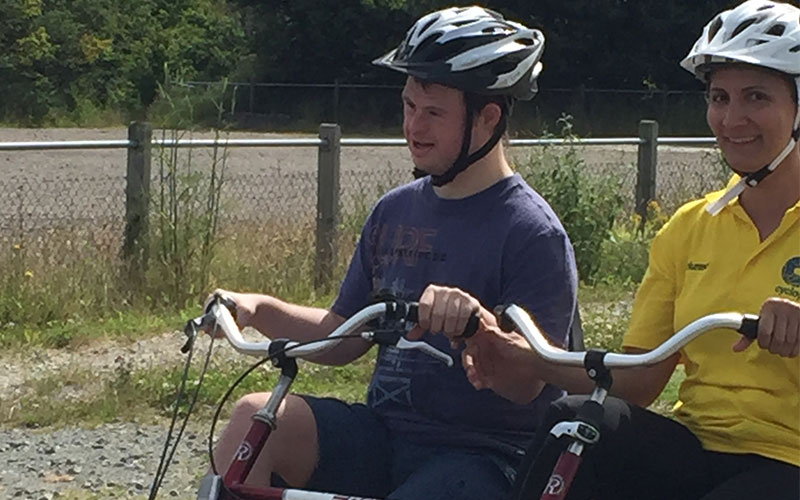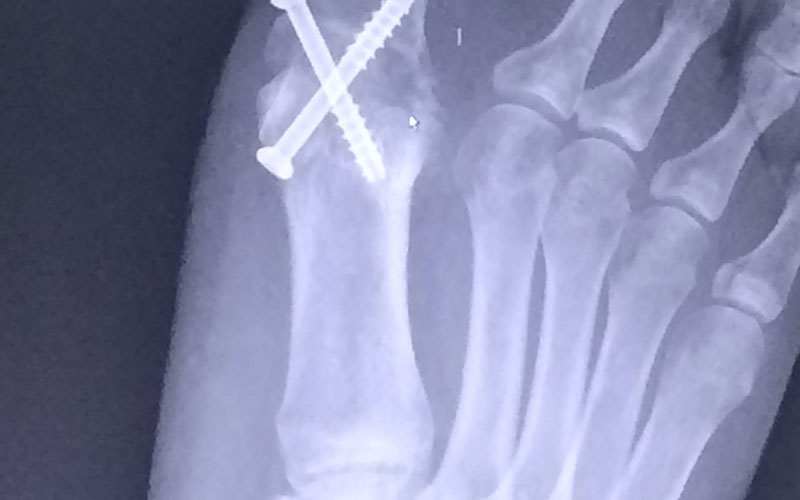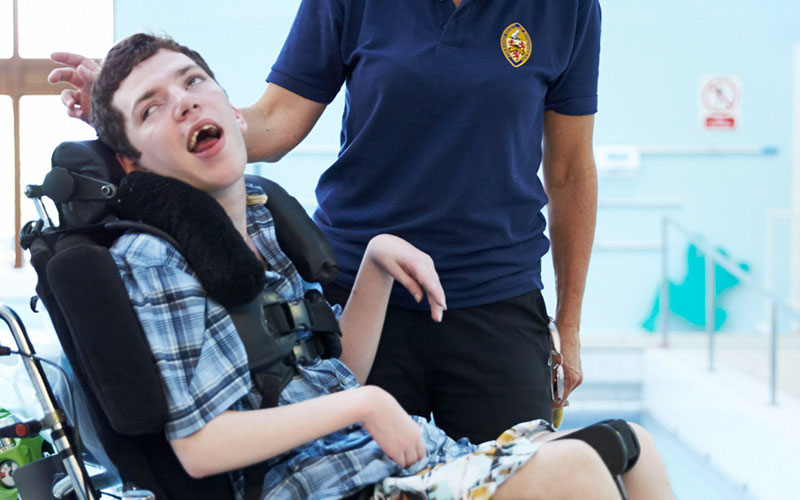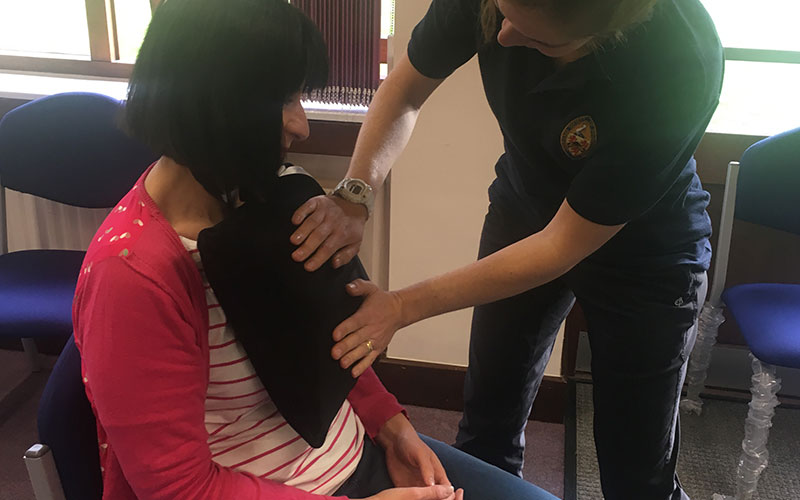We are a team of physiotherapists and assistant practitioners supporting people with learning disabilities across Kent.
Physiotherapists work together with people to reach their full physical function and ability. We aim to promote normal movement, reduce falls, minimise pain or discomfort and keep a clear and healthy chest.
We work with people and their families and carers.
We assess and give advice or training about exercise and activities, posture and positioning, use of equipment and specific respiratory techniques.
Keeping active and steady
 Being active and keeping fit can help with independent mobility which improves physical and mental wellbeing.
Being active and keeping fit can help with independent mobility which improves physical and mental wellbeing.
Movement programmes can help reduce a risk of falling and prevent the development of pressure ulcers or blood clots.
Exercise can also work with a healthy eating programme to maintain a healthy weight.
You may need a referral to physiotherapy if:
- you have had a fall or feel that you might be likely to have a fall
- you are finding it more difficult to get about at home or outdoors and might like to use a walking aid (such as a stick, walker or gait trainer)
- you are finding it difficult to move from one place to another or are needing to hold on to someone or the furniture to feel safe
- you would like to increase your physical mobility skills
- you use splints or special footwear to improve the stability of your joints.
 The physiotherapist may give you a home programme of exercises which will include cardiovascular exercises to keep your heart and lungs strong and healthy and also movement exercises to keep your muscles and joints healthy.
The physiotherapist may give you a home programme of exercises which will include cardiovascular exercises to keep your heart and lungs strong and healthy and also movement exercises to keep your muscles and joints healthy.
Leisure centres are a great place to keep active – you can go swimming (some pools are easier to get into than others), use the gym or join group classes. If you are finding it difficult to do activities at leisure centres you can call the physiotherapy team for help or advice.
The moving on up group is run by the physiotherapy and occupational therapy teams to introduce people with learning disabilities to exercising in leisure centres using gym equipment and/or exercises in the pool.
The Cyclopark in Gravesend offers special cycling sessions for people with different abilities, assessing and working out which bicycle is most appropriate. These include: wheelchair accessible bicycles, side-by-side bicycles, trikes, tandem and mountain bikes.
Manual handling and transfers
Transferring means to change position, for example, standing up from a chair, getting out of bed or moving from a wheelchair to the toilet. This could be on your own or with equipment and/or help from someone.
Physiotherapists and occupational therapists use moving and handling techniques to assess, advise and then teach individuals, carers, family, and other professionals. This might include using the correct equipment such as hoists, standing aids, riser recliners chairs, handling belts, slide sheets or grab rails. Kent County Council occupational therapy and assessment teams may work together with the health therapy teams.
Pain or injury
 You may see a physiotherapist following an injury or for pain in your joints or muscles. If you have new pain that you are not sure of the cause then you should seek medical attention.
You may see a physiotherapist following an injury or for pain in your joints or muscles. If you have new pain that you are not sure of the cause then you should seek medical attention.
Accidents such as falls or stumbles can result in a variety of injuries including fractures (broken bones), damage to ligaments or muscles. Specific physiotherapy advice and exercises can help regain movement, strength and function as part of rehabilitation.
Back pain can also be very disabling. General exercises to keep fit can help reduce back pain as well as specific exercises to keep your back flexible and strong.
As we get older our joints can get a little worn and these are arthritic changes. Physiotherapy treatment can work alongside medication to keep joints as flexible as possible.
Sometimes getting the medical help you need at hospitals and clinics can be difficult. All medical services should make reasonable adjustments for people with learning disabilities to make it as easy as possible to get the help you need. If you are finding it difficult then we may be able to help by working together with mainstream services.
Posture and joint health
 Good posture and positioning is very important to be active and effective in everyday living as well as comfortable and relaxed. This includes eating and drinking safely, socialising and communicating, sleeping well and being able to participate in activities.
Good posture and positioning is very important to be active and effective in everyday living as well as comfortable and relaxed. This includes eating and drinking safely, socialising and communicating, sleeping well and being able to participate in activities.
Good posture is also very important for breathing and bowel function.
You may need a referral to physiotherapy if:
- you would like help with setting up a postural management programme with a range of positions in sitting, lying and possibly standing throughout the day and night
- you would like some help with existing or new positioning equipment such as static chairs, sleep systems to support your posture in bed, standing frames or support at wheelchair clinics. You may also benefit from a referral to occupational therapy
- you have reduced movement and your soft tissues (muscles, tendons and ligaments) are tight and would benefit from a regular stretching / moving programme
 you find it easier to control your movements or stretch fully in a hydrotherapy or rebound environment
you find it easier to control your movements or stretch fully in a hydrotherapy or rebound environment- you would like some advice on how to apply for an NHS wheelchair or a private chair if you do not meet the criteria for provision.
Respiratory wellbeing
 Physiotherapy reduces the risk of chest infections for people who may have difficulties with lung expansion, effective coughing or clearance of food and drink when swallowing.
Physiotherapy reduces the risk of chest infections for people who may have difficulties with lung expansion, effective coughing or clearance of food and drink when swallowing.
A programme of physiotherapy exercises can:
- promote good posture – particularly when eating and drinking
- encourage active air entry to maintain clear airways and general fitness by active exercise and / or breathing exercises
- use percussive and vibrating techniques or equipment to help loosen secretions and promote effective huffing or coughing
- teach postural drainage (the use of positioning such as side lying or having the head of the bed tilted down which uses gravity to assist the drainage of secretions and improve lung clearance (if this is not contra-indicated by the persons condition).
You may need a referral to physiotherapy if:
- you have had more than one chest infection in the last few months and might have taken a while to recover
- you might cough or splutter when eating or drinking and feel that things sometimes ‘go down the wrong way’ – you may also be recommended for a speech and language therapy assessment if this is happening to you
- you have difficulty in fully clearing your chest when coughing and need assistance from other people or mechanical equipment
- you find that you get breathless very easily and need time to recover after a small amount of exercise
If you have significant or new difficulties in breathing or any blueness developing around your mouth please seek urgent medical attention.



